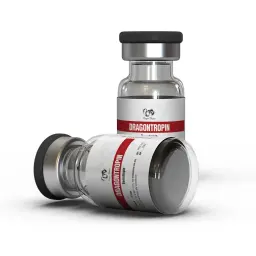



Manufacturer: PEPTIDE HUBS
Substance: SS-31
Pack: Vial (50 mg)
SS-31 (50mg), often discussed in scientific circles under the name Elamipretide, is one of the few research peptides that directs its focus not to muscles, hormones, or tissues—but to the very engine that keeps all training possible: the mitochondria. This gives SS-31 a rare identity within performance science. While most peptides revolve around recovery or cellular signaling, SS-31 is studied for how it interacts with the power-production machinery inside every muscle fiber.
For bodybuilders, strength athletes, and high-output competitors, understanding mitochondrial function is more than biology—it's an insight into how endurance, energy turnover, recovery between sets, and long-term athletic longevity are shaped on a microscopic scale.
SS-31 is engineered to reach the inner layers of the mitochondria where energy transfer takes place. Research shows particular interest in its ability to bind with cardiolipin, a structural lipid that helps maintain the shape and function of mitochondrial membranes.
This specificity is what separates SS-31 from conventional performance-related peptides:
It is designed to localize within the mitochondria, not circulate broadly.
It focuses on membrane health rather than hormonal pathways.
It addresses energy efficiency from a structural biology perspective.
For athletes who push their cellular engines to the limit, this approach is uniquely compelling.
Athletes thrive or struggle largely based on how much energy they can produce, use, and replenish. SS-31 research ties directly into this foundation.
Mitochondria play a decisive role during hypertrophy blocks and conditioning circuits. When mitochondria struggle, fatigue arrives earlier, limiting total training volume. Studies on SS-31 contribute to understanding how mitochondrial integrity affects sustained workload.
Although explosive movements rely heavily on phosphocreatine, the ability to repeatedly perform power-based sets depends on how quickly ATP is regenerated. Research into mitochondrial peptides like SS-31 offers insights into this recovery loop.
Cyclists, runners, CrossFit™ athletes, and combat-sport competitors rely on mitochondrial output for performance consistency. SS-31's interaction with cardiolipin has made it a focal point of endurance-related research.
Every intense training cycle produces oxidative stress. SS-31 research examines mitochondrial resilience in high-stress environments, giving athletes a new perspective on fatigue management.
Most peptides associated with sports science fall into predictable groups—recovery, collagen support, inflammation modulation, or hormonal pathways. SS-31 stands alone in a category centered on intracellular energy optimization.
Key distinguishing traits include:
Selectivity for mitochondrial membranes
Research orientation toward structural stabilization
Potential implications for cellular aging under heavy athletic output
Relevance across both strength and endurance domains
This makes SS-31 one of the most forward-thinking topics in modern athletic science.
While bodybuilding is often associated with muscle size, behind the scenes lies a massive energetic demand:
Training sessions can extend beyond 90 minutes.
High-rep hypertrophy work requires large ATP reserves.
Contest prep introduces caloric restrictions that pressure mitochondrial function.
SS-31 research provides valuable concepts for understanding how to maintain intensity when energy availability becomes compromised. Mitochondrial efficiency is increasingly recognized as a key performance variable—not just for endurance athletes, but for physique athletes seeking consistent training output during challenging phases.
SS-31's biggest contribution to the athletic world might not be direct performance enhancement, but the shift in perspective it encourages. Instead of focusing only on muscles, hormones, or nutrients, it pushes athletes to think about:
mitochondrial health as a performance driver
intracellular energy leakage and inefficiency
how training style influences mitochondrial resilience
why some athletes handle volume better than others
These insights reshape how coaches program long-term training and recovery cycles.
SS-31 (50mg) holds a distinctive place in modern sports science as a mitochondria-targeted research peptide with implications for energy production, fatigue resistance, and cellular resilience. Its focus on the inner workings of the mitochondria makes it particularly relevant for athletes who rely on high-output performance, whether that involves heavy lifting, long-duration conditioning, or rapid recovery between intense efforts.
Please log in to write SS-31 50mg review.


Drug Class: Anabolic Androgenic Steroid Injection
Administration: Intramuscular Injection
Manufacturer (Brand): KALPA PHARMA
Chemical Substance: Drostanolone Propionate
Strength: 100 mg/ml
Unit: 1 VIAL x 10 ml [Sterile Multiple Dose]
Common Dose: 300-500 mg/week; 8-10 weeks;
Goal: Cutting

Drug Class: Anabolic Androgenic Steroid Injection
Administration: Intramuscular Injection
Manufacturer (Brand): KALPA PHARMA
Chemical Substance: Trenbolone Blend
Strength: 150 mg/ml
Unit: 1 VIAL x 10 ml [Sterile Multiple Dose]
Common Dose: 1ml/EOD; 4-8 weeks;
Goal: Cutting

Drug Class: Anabolic Androgenic Steroid Injection
Administration: Intramuscular Injection
Manufacturer (Brand): KALPA PHARMA
Chemical Substance: Trenbolone Enanthate
Strength: 200 mg/ml
Unit: 1 VIAL x 10 ml [Sterile Multiple Dose]
Average Dose: 300 - 600mg/week; 8-12 weeks;
Goal: Bulking

Drug Class: Anabolic Androgenic Steroid Injection
Administration: Intramuscular Injection
Manufacturer (Brand): KALPA PHARMA
Chemical Substance: Trenbolone Acetate
Strength: 100 mg/ml
Unit: 1 VIAL x 10 ml [Sterile Multiple Dose]
Dosage: 50-100mg/EOD; 6-10 weeks;
Goal: Cutting

Drug Class: Anabolic Androgenic Steroid Injection
Administration: Intramuscular Injection
Manufacturer (Brand): KALPA PHARMA
Chemical Substance: Testosterone Propionate
Strength: 100 mg/ml
Unit: 1 VIAL x 10 ml [Sterile Multiple Dose]
Average Dose: 1ml/EOD; 6-10 weeks;
Goal: Lean Mass, Cutting, Strength

Drug Class: Anabolic Androgenic Steroid Injection
Administration: Intramuscular Injection
Manufacturer (Brand): KALPA PHARMA
Chemical Substance: Testosterone Enanthate
Strength: 250 mg/ml
Unit: 1 VIAL x 10 ml [Sterile Multiple Dose]
Common Dose: 2ml/week; 10-12 weeks;
Goal: Bulking

Drug Class: Anabolic Androgenic Steroid Injection
Administration: Intramuscular Injection
Manufacturer (Brand): KALPA PHARMA
Chemical Substance: Testosterone Cypionate
Strength: 250 mg/ml
Unit: 1 VIAL x 10 ml [Sterile Multiple Dose]
Effective Dosage: 500mg/week; 8-12 weeks;
Goal: Bulking